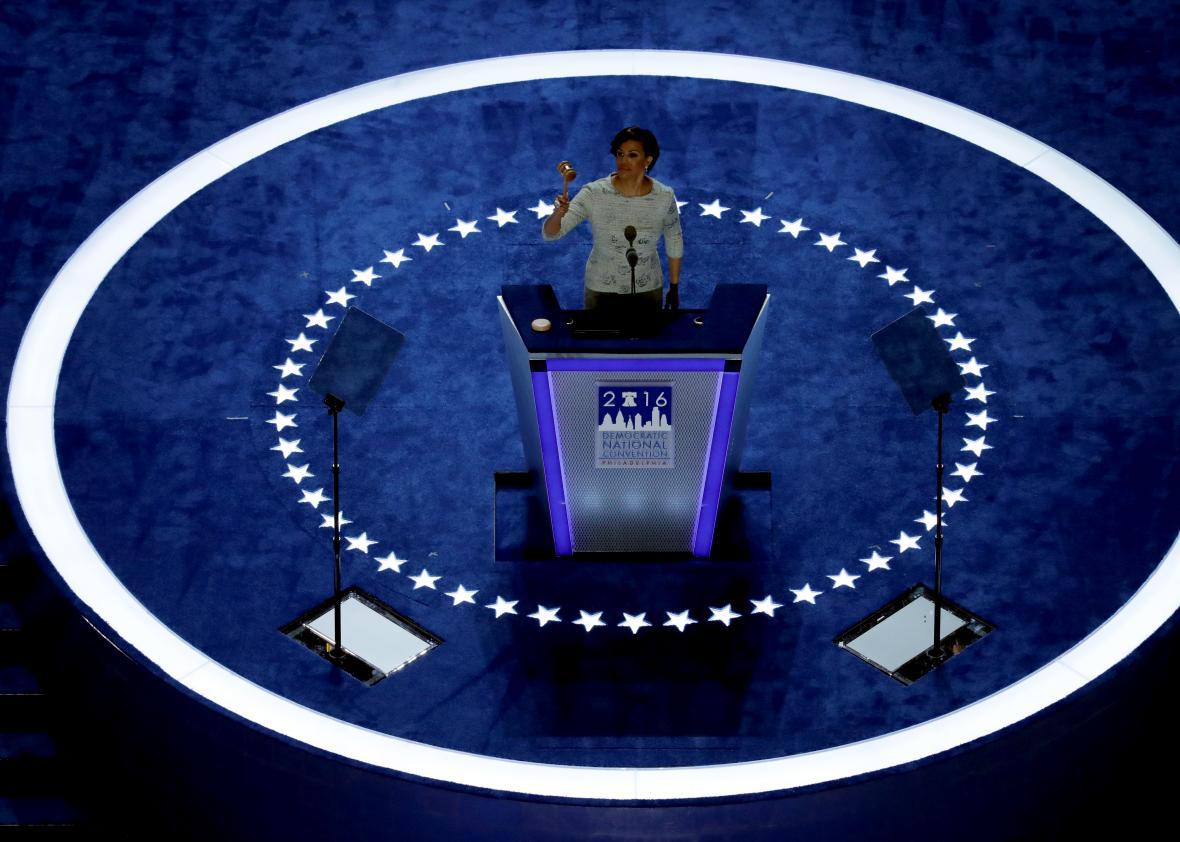PHILADELPHIA—On the opening day of the Democratic National Convention, it seems as if Democrats are in actual disarray. It’s hard to type that with a straight face, “Dems are in disarray” being such a sturdy cliché of political journalism. But the headlines today seem to be getting at some undeniable rifts in the party. Leaked emails from the Democratic National Committee show disdain and anger for Bernie Sanders, undermining its claims of neutrality in the primary and leading to the much-sought ouster of Florida Rep. Debbie Wasserman Schultz from her position at the top of the DNC. On the streets, frustrated Sanders delegates are knocking Hillary Clinton, Wasserman Schultz, and the party nominee for vice president, Virginia Sen. Tim Kaine.
As governor of Virginia, Kaine walked a delicate line, pleasing liberals with fights against the National Rifle Association and the state’s major tobacco growers and appeasing conservatives with his “personally pro-life” politics and support for anti-abortion messages, like the “Choose Life” license plates he authorized while in office. Kaine left office in 2009—governors of Virginia are limited to one term—but returned to statewide politics in 2012 as a successful candidate for Senate.
As a senator, he’s been a team player, voting with the Obama administration on most of its priorities, and amassing a largely liberal record. But in his 10 years on the state and national stage, Democratic politics have moved to the left. The party grassroots wants a liberal champion, if not for the top of the ticket, then at least for vice president. Kaine doesn’t fit the bill, and those frustrated Sanders delegates are angry.
“If Clinton has reached out to Bernie supporters, it appears that she has done so to stick triangulating thumbs in their eyes,” said Norman Solomon, coordinator of a group which claims to represent hundreds of Sanders delegates at the convention, to the Washington Post.
You heard similar language—or at least a similar tone—from Sanders surrogates like actress Rosario Dawson, who told a collection of Bernie supporters and delegates that they should press on with their demands, regardless of what happens. “If Trump wins,” she said, “it’s not our fault.”
But for all of this anger and apparent discord—which included a room of Bernie backers booing the Vermont senator for endorsing Hillary Clinton—it’s not clear the Democratic Party is in actual disarray.
Yes, there are angry and discontented delegates who supported Bernie Sanders in the primaries. Some are avowedly anti-Hillary and believe Sanders was sabotaged by the DNC in an effort to subvert the will of Democratic voters. There is no evidence that this is true. If, in January, you looked at nothing but the demographics of Clinton and Sanders support, you could have predicted the outcome. Here’s what I wrote at the beginning of the year. “If Sanders can break or subvert Clinton’s relationship with black Democrats, he can win. If he can’t, he won’t.”
More important than the mechanics of the primary, however, is the simple fact that these delegates—these vehemently anti-Clinton voters—are an unrepresentative minority of all Bernie supporters. Of the voters who backed Sanders throughout the course of the Democratic primary, 90 percent support Clinton, according to a new survey from the Pew Research Center. Of those who switched from Clinton to Sanders or from Sanders to Clinton, 88 percent now back Clinton. Even with a third-party candidate in the mix, as noted by Harry Enten of FiveThirtyEight, the picture is one of general unity, with around a third of Sanders’ primary voters rejecting the Clinton ticket. And those voters are neither regular voters nor consistent Democrats. Many are voters who normally support third-party candidates, but who signed on to Bernie’s campaign because of its distance from the Democratic establishment.
None of this is to say that everything is fine for Hillary Clinton and the Democratic Party. Despite its ugliness (or perhaps, because of it), Donald Trump has earned a “bump” from the Republican National Convention in Cleveland, unifying Republicans behind his candidacy and winning some independents to his side. Depending on where you look, Trump is either tied with Clinton or leading. Restrict yourself to polling averages, and you see a similar story: Trump has stabilized and pulled himself even with Hillary Clinton.
Convention-day discontent aside, the Democratic Party is largely unified behind Clinton, in part because the party is unified behind Barack Obama, her most consequential booster. But if Trump’s momentum is any indication, mere unity isn’t enough. Clinton will have to find a way to pull those discontented Bernie supporters into the fold, and keep them from drifting to third-party candidates, or even from backing Trump.
It’s easier said than done. Before Clinton announced Kaine for vice president, she floated Massachusetts Sen. Elizabeth Warren, in the form of a joint campaign appearance. Warren is fiercely popular with these Sanders voters, but in the wake of her endorsement, she was hit with their ire, condemned for backing Clinton. And as we saw Monday afternoon, even Bernie can’t temper their anger.
Which leaves us with a series of questions. For as much as they say they want a progressive path for the future of the country—a “political revolution,” as it were—are they willing to enter any coalition to achieve it? Is there anything Clinton (or Sanders or Warren) can say or do to attract their support? Are they here to win, or are they here to perform?
